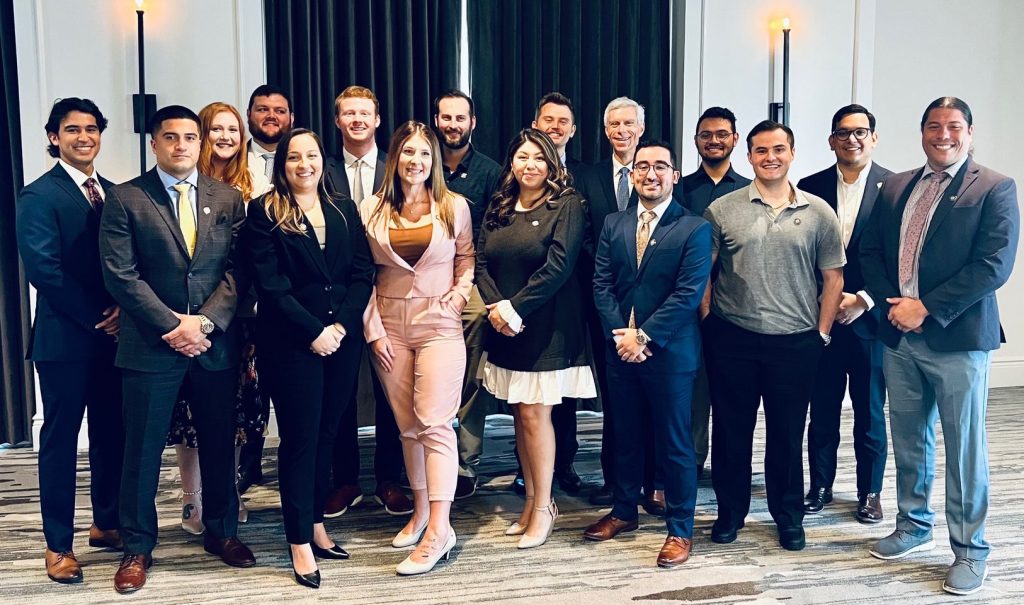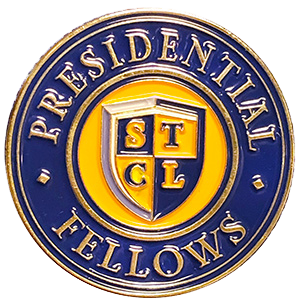Presidential Fellows Program
About the program
The Presidential Fellows program represents a small cohort of those within the class who have achieved academic excellence. Presidential Fellows receive unique opportunities to learn, network, grow, and develop as law students during their tenure at South Texas College of Law Houston.

 The Presidential Fellows Program (PFP) is an academic honors program for students who finish in the top 30% of the class after their first semester, and first-year of law school. Presidential Fellows receive opportunities to engage in networking and professional development opportunities, as well as other social experiences. The PFP recognizes and acknowledges the academic achievement of these valued leaders in the law school community.
The Presidential Fellows Program (PFP) is an academic honors program for students who finish in the top 30% of the class after their first semester, and first-year of law school. Presidential Fellows receive opportunities to engage in networking and professional development opportunities, as well as other social experiences. The PFP recognizes and acknowledges the academic achievement of these valued leaders in the law school community.
Upon receiving recognition of entering the program, Presidential Fellows are invited to attend an inaugural lunch with the Dean and several first-semester faculty members. Invited speakers at the luncheon usually include recent graduates who discuss the importance of continuing academic excellence, bar preparation, advocacy, journals, and judicial clerkships. New Presidential Fellows receive a lapel pin that can be worn at alumni events, networking sessions, or during on-campus interviews, identifying their recognized excellence at South Texas.
Presidential Fellows receive priority assistance with the Career Resource Center when preparing for interviews. During the fall semester Presidential Fellows are invited to a happy hour with the Dean and several faculty members, and are invited to attend key alumni functions. They receive recognition in internal law school communications, as well as the alumni magazine, InRe.
Below are just a few of the benefits that Presidential Fellows receive.
- Inaugural kick-off event
- Career Resource Center priority assistance
- Presidential Fellows lapel pin
- Recognition and promotion of your academic excellence
- Fall activity with the Dean and faculty
- Networking opportunities with alumni and judges
- Professional headshot
- Access to funds for conferences or CLE events
Attend a conference or CLE
The law school will provide funds to select Presidential Fellows to attend an out-of-town conference; or to attend an off-campus CLE.
The conference or CLE must take place within this calendar year.
If you are interested please complete and submit the application at least 30 days in advance of the program you wish to attend.
Ten Reasons Why Every Law Student (Who Can) Should Serve as a Judicial Law Clerk
Fellow students of law:
Clerk for a judge if you possibly can. In Texas, the state supreme court, federal appellate and trial courts, and federal magistrates and bankruptcy courts hire clerks. Federal administrative law and immigration courts also hire clerks. Across the country, federal and state courts (including many state trial courts) together hire thousands of clerks each year. The typical trial judge’s clerk researches and writes for the judge, assists during oral argument or trial, and helps with case management. An appellate judge’s clerk will read the briefs, prepare a bench memo recommending a decision, and in many cases write the first draft of the opinion. A clerk’s term usually lasts one or two years. Any graduate can serve as a clerk (few judges require their clerks to have passed a bar exam), but many judges interview and extend offers to 2Ls and 3Ls, who then wait until after graduation to begin work.
Eleven of us clerked with judges on a U.S. Court of Appeals. Seven of us clerked for federal district courts. One of us clerked for the U.S. Tax Court. Nine of us clerked for state appellate or trial courts. Aside from teaching and certain pro bono representations, working for a judge was the most satisfying and worthwhile thing we have done with our legal education since graduation. The benefits of clerking are many:
First, the judicial law clerk generally apprentices with an excellent lawyer. Most judges are excellent lawyers. No better way exists to learn about lawyering than to spend a year working cases with a great lawyer.
Second, and relatedly, the clerk works with the decision-maker. The clerk sees how attorneys try to persuade the judge; the clerk sees what works and what does not. A clerk might assist the judge in changing the course of a case and, perhaps, the law.
Third, clerks gain confidence. New attorneys fear failure. Cautious ones take too long with assignments; incautious ones finish too soon. The clerk learns by experience when enough is enough, because the clerk watches a judge say daily what is enough. Besides clerking, only years in practice can so educate an attorney.
Fourth, the job builds skills. Our work had to be correct, clear, and concise because, when the judge had finished his or her editing, what had begun as our work became the judge’s opinion. In reading briefs, we learned how to write (and how not to write) a brief. Later, in practice, senior attorneys would ask us for advice and for our work because we had experience they lacked. Our co-clerks were also excellent writers and editors.
Fifth, the work is marvelous. Clerks for appellate judges work on cutting-edge issues of law—only undecided legal issues require an appellate court’s attention. Trial court clerks often work on complex and interesting cases; no other cases require much of the trial court’s time.
Sixth, the job is a reputation-builder. Seeing a judge’s name on a resume impresses hiring partners. In practice, former judicial law clerks have increased credibility with colleagues and judges.
Seventh, clerkships can lead to good jobs. Most judges know their legal community better than anyone else. In fact, most are leaders in that community. No better way exists to break into a job market than to start at the top.
Eighth, clerks have a generally steady workload. Private practice can be grueling. Lawyers in practice often work long hours (in six-minute increments) putting out fires, with little time to sit back and learn from what they are doing. Not so in a judge’s chambers (particularly in an appellate court)—the usually steady flow of cases means that time, including time for reflection, can often be budgeted. New attorneys need that time.
Ninth, judges try to hire people who are pleasant. Judges often employ at least two clerks at a time. Some have three clerks. Our co-clerks were bright, energetic, and entertaining, and the judge’s other staff were helpful. Some courts place judges’ chambers together, and all their clerks meet. Over the course of a year, co-clerks and other co-workers can become good friends.
Tenth, and out of order in importance, clerking is public service. The judiciary remains “of the people” and “for the people.” Spending a year for the people starts a service- oriented career on the right track.
Maybe this picture looks too uniformly rose-colored. In disclaimer, we add these: No two clerkships are exactly the same. Occasionally big cases or caseloads will require the clerk to spend long hours at the courthouse. Also, no two judges will have their clerks work the same hours or do exactly the same work; some clerkships require less writing, or more cite-checking, than others, for instance. Further, no two courts are the same. Clerking for a trial court provides experiences appellate work does not, and vice versa. And the salary is a very livable wage but less than an average new associate’s in a large firm. Federal judicial clerk base pay is JSP-11 step 1 (and the location matters). For Texas appellate court law clerk (formerly “briefing attorney”) salaries, check recent want ads posted at txcourts.gov, under “Careers.” Many firms pay a hiring bonus to former clerks and move them up with their class for pay and promotion purposes. But regardless of the pay, the benefits of clerking more than compensate during the clerkship and for the remainder of a life in the law.
If you have any interest at all in clerking, please talk with the Career Resource Center. They have lists of ways to go about getting this ultimate young lawyer’s job. Or please talk with any of us. The time frame for applying varies with the judge, so seek information early and often.
Michael F. Barry
President and Dean
Clerk, Judge Royce C. Lamberth, U.S. District Court for the District of Columbia, 1992-93 Clerk, Chief Judge Gerald Bard Tjoflat, U.S. Court of Appeals for the Eleventh Circuit, 1993-94
Josh Blackman
Charles Weigel II Research Professor and Professor of Law
Clerk, Judge Kim R. Gibson, U.S. District Court for the Western District of Pennsylvania, 2009-11 Clerk, Judge Danny Boggs, U.S. Court of Appeals for the Sixth Circuit, 2011-12
Vanessa Browne-Barbour
Professor of Law
Clerk, Judge Justin M. Johnson, Pennsylvania Superior Court, 1993-94
Catherine Greene Burnett
Vice President, Associate Dean for Experiential Learning, Director of the Pro Bono Honors Program, and Professor of Law
Briefing Attorney for Judges William A. Morrison, Thurman M. Gupton, and William T. Phillips, Texas Court of Criminal Appeals
Elaine A. Carlson
The Stanley J. Krist Distinguished Professor of Texas Law
Briefing Attorney for Justice James Wallace, Texas First Court of Appeals—Houston
Richard R. Carlson
Professor of Law
Clerk, Judge Lewis Morgan, U.S. Court of Appeals for the Fifth Circuit, 1979-80
Amanda Harmon Cooley
Professor of Law
Clerk, Chief Judge Hayden Head, U.S. District Court for the Southern District of Texas, 2003-05
Matthew J. Festa
Professor of Law
Clerk, Judge William O. Bertelsman, U.S. District Court for the Eastern District of Kentucky, 2002 Clerk, Judge Deborah Cook, U.S. Court of Appeals for the Sixth Circuit, 2003
Sharon G. Finegan
Professor of Law
Clerk, Chief Judge Claude Hilton, U.S. District Court for the Eastern District of Virginia, 2001-02
Rob Galloway
Professor of Law, Vice President, Advocacy, and W. James Kronzer Jr. Distinguished Professor of Advocacy
Clerk, Judge Fortunato P. Benavides, Texas Court of Criminal Appeals, 1991-92
Joseph K. Leahy
Professor of Law
Clerk, Judge M. Blane Michael, U.S. Court of Appeals for the Fourth Circuit, 1997-98
Bruce A. McGovern
Professor of Law and Director, Tax Clinic
Clerk, Judge Thomas J. Meskill, U.S. Court of Appeals for the Second Circuit, 1989-90
James W. Paulsen
Professor of Law
Briefing Attorney for Justice Ted Z. Robertson, Supreme Court of Texas, 1984-85
Charles W. “Rocky” Rhodes
Professor of Law
Briefing Attorney for Justice Raul Gonzalez, Supreme Court of Texas, 1992-93
Staff Attorney for Justice Greg Abbott, Supreme Court of Texas, 1996-98
Val D. Ricks
Professor of Law
Clerk, Judge Charles Wiggins, U.S. Court of Appeals for the Ninth Circuit, 1993-94
Njeri I. Mathis Rutledge
Associate Judge, City of Houston, and Professor of Law
Clerk, Chief Judge John T. Nixon, U.S. District Court for the Middle District of Tennessee, 1996-97
D’Andra Millsap Shu
Assistant Professor of Law
Clerk, Judge Carolyn Dineen King, U.S. Court of Appeals for the Fifth Circuit, 1996-97
Chambers Attorney for Justice Leslie Brock Yates, Texas Fourteenth Court of Appeals—Houston, 2004-11
Clerk, Justice Eva M. Guzman, Supreme Court of Texas, 2017-18
Mark R. Siegel
Professor of Law
Attorney Advisor for Judge Julian Jacobs, U.S. Tax Court, 1988-90
Mark E. Steiner
Vice President, Associate Dean for Students, and Professor of Law
Staff Attorney, Texas First Court of Appeals—Houston, 1986-89
Cherie O. Taylor
Vice President, Associate Dean of Academics, Director of the Institute for International Legal Practice and National Security, and Professor of Law
Clerk, Judge Thomas A. Clark, U.S. Court of Appeals for the Eleventh Circuit, 1983-84
John J. Worley
Co-Director of the Transactional Law Practice
Certificate Program and Professor of Law Clerk, Chief Judge Charles Clark, U.S. Court of Appeals for the Fifth Circuit, 1980-81
Kevin M. Yamamoto
Professor of Law
Clerk, Senior Judge Irving Hill, U.S. District Court for the Central District of California, 1992-93

